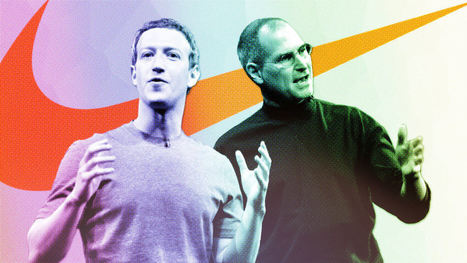 Your new post is loading...
 Your new post is loading...
According to an Oxford University analysis, close to half of all jobs will be taken over by robots in the next 25 years. No wonder the press is full of handwringing about how workers will adjust and the best way to prepare the next generation for this A.I.-filled future. But not everyone is alarmed about the prospect of radical change in the labor market. After all, this has happened before (for instance, when mechanization replaced the vast majority of farmers) and it turned out OK. Plus, a lot of today's jobs are soul-crushingly boring and repetitive. Losing them just might be a blessing. Among these optimists are IT service company Cognizant. In a recent report (hat tip to Business Insider for the pointer), the consultancy notes that while creative destruction has always been with us, so has reinvention. Sure, robots will take jobs away, but they'll also create new ones. What will these new gigs look like exactly? The report imagines detailed job ads for 21 future careers that Cognizant thinks may emerge in the next 10 years.
Via The Learning Factor
Companies want to be profitable and maximize their performance and impact both in the world and within their industry. With that said, accomplishing those feats starts with cultivating a culture to allow those things to happen which starts with a priority on employee well-being. Culture is important -- it affects engagement, mindset, reputation, recruitment of talent, and well being. When looking to cultivate a healthy and high performing culture, start by emphasizing these six points:
Via The Learning Factor
We might spend days, months, or even years trying to figure someone out. Is he who he says he is? Should I trust her? The wheels in our head spin as we think of all the variables and how they'll play out. And still, we keep hearing that we should just listen to our instincts. Complicated questions, simple answer. What should we do, and where did this whole idea of the gut instinct come from, anyway? Intuition isn't some magical, mysterious quality that we carry with us. It actually comes from the knowledge and past experiences that we all carry. Even if we're unable to explain why we feel the way we do, there's a logical explanation behind our gut feelings. Whenever you encounter anything new, the unconscious side of your brain is constantly making assessments. It takes in certain cues, such as a smile or parts of a story, and then matches it with something similar in our database of memories to come up with a conclusion. Meanwhile, our conscious side remains unaware of this rapid process taking place.
Via The Learning Factor
Defined hierarchy. Commanding leadership. These corporate ligaments secure firms in the face of threats and unify them against competition. Few beliefs are more widely held in business. The intuition, though, is wrong. “When you look at real organizations, having a clear hierarchy within your firm actually makes people turn on each other when they face an outside threat,” says Lindred Greer, a professor of organizational behavior at Stanford Graduate School of Business. Effective teamwork against threats requires not hierarchy, but egalitarianism; not centralized power, but a culture in which all voices count. Along with Lisanne van Bunderen of the University of Amsterdam and Daan Van Knippenberg of Drexel University, the research team teased out this finding through two complementary studies. In the first study, an experiment, teams of three students developed and pitched a consultancy project to a prospective client. Some of these teams were non-hierarchical, while members of other teams arbitrarily received titles: senior consultant, consultant, junior consultant. Likewise, some teams faced no rivals, while others were told they were competing with a rival firm for clients. The researchers found that the subset of hierarchical teams facing competition with rival firms struggled with infighting while the egalitarian teams cooperated on their work.
Via The Learning Factor
Millennials are starting to take control in the workplace. There are now more than 75 million millennials in the workforce, more than baby boomers (just shy of 75 million) and Gen Xers (66 million). Now entering their late 20s and early 30s, the oldest members of the generation are starting to take more leadership positions in major organizations. Despite the fact that millennials are sporting one of the lowest rates of entrepreneurship in 25 years, 60% see themselves as entrepreneurs, and 90% recognize entrepreneurship as a mindset. Combined with their natural tendencies toward independent thought and mild to moderate anti-establishment vibes, this is making millennials a strong force of direction and leadership—and an even stronger one to come in the next several years.
Via The Learning Factor
First-time managers often ask themselves how to develop a leadership style that suits them: “Who should I model myself after? What kind of leader should I be?” It’s great to think critically about your approach to managing others, particularly when you’re new to it, but these questions won’t exactly help you. That’s because they assume that leadership is something you try on and show off, a “style” that’s curated and intentional. But especially in the beginning, your style will be based far less on mirroring others’ habits and behaviors and far more on instinct and intuition. And that’s not necessarily a bad thing.
Via The Learning Factor
Good leaders can steer a business through the nine to five, but great leaders can navigate a company into the next generation. While a good leader is content with the status quo, a truly great leader has the ability to innovate and disrupt to ensure organisations stay on the cutting edge. They go above and beyond the duty of a manager to inspire staff and build a motivated workplace. Stepping up from a good to a great leader could make a huge difference to the direction of a business and it's possible with some simple, but effective practices.
Via The Learning Factor
"Power is a subject that makes many people extremely uncomfortable," Stanford professor Jeffrey Pfeffer argues, but just because we don't like to think about power doesn't mean it's not the lifeblood of business. "Power is in fact all around...like air and water and gravity," he insists. Ignoring power, therefore, won't make it disappear any more than wishing away gravity will help you fly. Instead of sticking your head in the sand, Pfeffer suggests you get real and start thinking constructively about accumulating power. How can you do that? In the video he offers a handful of actionable (if not necessarily universally palatable) tips. .
Via The Learning Factor
1. Don't pretend you're not really in charge. If the buck stops at your desk, acting like you're the same as everyone else won't work. It's a bit like parents who try to function as their children's friends, rather than as authority figures. It may be more fun in the short run, but will likely lead to bad results in the long run. There are a very few exceptions--one is Morning Star, the tomato processor that has rigorously maintained a non-hierarchical structure since the 1970s. But that takes a lot of forethought, planning, and careful hiring of like-minded individuals. And even so, the company's non-CEO founder must occasionally serve as decider of last resort when employees are unable to resolve their conflicts.
Via The Learning Factor
|
Let’s not waste any time. The simple solution that we’re all looking for: It doesn’t exist. Want your business to thrive like Amazon’s? Want to emulate Steve Jobs or Mark Zuckerberg? Follow the road map of Nike or Warby Parker to build the next brand that matters? Sorry, it doesn’t work that way. What succeeded for them may not work for you. Too bad. Get over it. One-size-fits-all strategies just aren’t effective in today’s age of flux (and maybe they never were). That’s one of the insightful messages in senior writer Austin Carr’s feature The Future of Retail in the Age of Amazon. It’s become common practice to refer to billion-dollar startups as “unicorns,” but there is no more one-of-a-kind business than Amazon: hard-driving, customer-focused, yet broadly directed, from books and groceries to entertainment, consumer electronics, and web services. Carr explains that competing with Amazon today–trying to beat it at its own game–is largely a fool’s errand. Instead, what increasingly defines retail success, and points the way toward the businesses of tomorrow, is a bespoke model, one that is crafted to deliver on a focused need, proposition, or brand essence.
Via The Learning Factor
Leadership challenges are more complex today than ever before, and one leadership challenge that I see as an executive coach is the tendency to anticipate what might happen tomorrow while forgetting about what is happening today. In other words, leaders try to outthink and overanalyze the future. They anticipate all the possibilities that could happen, select the outcome most likely to occur and then mold their leadership style to accommodate it, only to find that Murphy has a full-time job and is apparently dedicated solely to them — and Murphy wins.The point is, tomorrow, next week or next year are all uncertain, so if you try to mold your leadership style to the “most likely” option to occur, then you’re not leading, you’re contingency planning. Leaders don’t just think about the future, they think in it. Once they have a clear picture of what they want to see, where they want to be—as an individual or as a team — and why, they begin to mold the world around them to achieve it.
Via The Learning Factor
From a wealth of real-world examples such as Warren Buffett and Bill Gates to a ton of science and expert opinion, there's no shortage of evidence that introverts can make great leaders. But, of course, quieter types can only demonstrate this fact if they decide to step up to the plate and lead. And according to new research, many introverts may be shying away from leadership positions in which they'd actually excel, because of misplaced fears about their potential and capabilities.
Via The Learning Factor
To effectively lead and motivate employees, you don’t need charisma and a grand vision. Research from Michigan State University (MSU) found that being a successful boss was more about mind over matter. The study, published in the journal Organizational Behavior and Human Decision Processes, found that a leader’s focus, or mind-set, affects his or her own behavior, which in turn affects employees’ motivation. And the good news is that your mind-set can be changed to produce certain outcomes from workers, from creativity to loss prevention. “Effective leadership may be based in part on a leader’s ability to recognize when a particular mental state is needed in their employees and to adapt their own mental state and their behaviors to elicit that mind-set,” says Brent Scott, MSU professor of management and study coauthor. “Part of the story here is that you don’t have to be Steve Jobs to be an effective leader. There is no one-size-fits-all approach to managing.”
Via The Learning Factor
We all know that the work landscape is changing. The jobs that will be in demand are shifting as more are automated by artificial intelligence, machine learning, and robots. Teams are becoming more disparate and globalization has added new collaboration challenges. At the same time, more millennials are taking on management roles, and even our work spaces will undergo changes between now and 2025. “Change will be happening so quickly that 50% of the occupations that exist today will not exist 10 years from now. So we’re going to be living in an environment that is extremely adaptable and changing all the time,” says Liz Bentley, the founder of Liz Bentley Associates, a leadership development consulting firm.
Via The Learning Factor
You don’t need to be told why it matters to be transparent and honest at work–that much is a given. So is the overall usefulness of expressing yourself clearly, confidently, and with as few filler words as possible. But in the effort to do that, many of us fall back on common expressions that might sound totally fine in social situations but can do some quiet damage in the workplace. One of them is “I’m sorry.” Another is “to be honest.” The latter turn of phrase–and versions of it, like “honestly,” “frankly,” “if I can be honest with you,” or “let me be frank”–is easy to resort to when you want to cut through the crap, come clean, or offer your unvarnished opinion. But these expressions also tend to attach themselves to–and subtly encourage–certain messages that are either better left unsaid or ought to be rephrased. Here are times when “to be honest” can make you sound less authoritative around the office.
Via The Learning Factor
Leadership is often associated with words like "charisma," "power," "outgoing," and "confident." As a result, introverted and quiet changemakers may have difficulties envisioning what their leadership looks like. But core aspects of leadership, such as those described by transformational leadership researchers James MacGregor Burns, Bernard M. Bass, James Kouzes, and Barry Posner, and by Good to Great author Jim Collins, reflect ideas that are in total alignment with quiet changemakers, and you don’t need to be in a position of authority or have a formal leadership role to practice these leadership characteristics.
Via The Learning Factor
Want to leave your number one business rival lying in a crumpled pile of rubble? Then put down your Android for a minute so you can size up exactly who that opponent is.
The assassin most likely to destroy your business isn’t the guy down the street. It’s not a brilliant 19-year-old coder lying in wait in a ranch house in Palo Alto.
It’s a ‘bot that does what you do—even better.
If robots can be encoded with artificial, emotional intelligence and it is greater than what you and your team have to offer to guests, you will be out of work. And emotional intelligence in robots is closer than you’d think.
Via The Learning Factor
The most successful bosses and the ones employees respect and follow most easily, and who are most likely to be promoted--tend to share the following eight core beliefs:
1. Business is an ecosystem, not a battlefield.
Average bosses see business as a conflict among companies, departments, and groups. They build armies of troops to order about, demonize competitors as "enemies," and treat customers as territory to be conquered.
Great bosses see business as a symbiosis through which the most diverse company is most likely to survive and thrive. They create teams that adapt easily to new markets and can quickly form partnerships with other companies, customers, and even competitors.
Via The Learning Factor
|



 Your new post is loading...
Your new post is loading...





































Yes, A.I. will destroy tons of jobs, but it will create tons too. Like these.